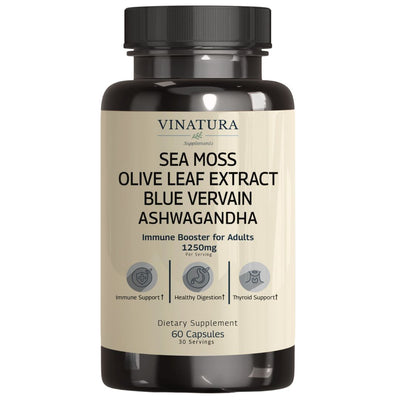
Lactobacillus Reuteri For Autism & Anxiety And Depression
Increasing scientific research has found evidence that Lactobacillus Reuteri, a natural gut-residing bacterium, holds promise in alleviating symptoms of autism, anxiety, and depression. Research brings hope that a safe, natural supplement could support brain health and behavior in those with these conditions. In this article, let's delve deeper into the benefits of Lactobacillus Reuteri for autism, anxiety and depression by shedding light on the gut-brain connection and reviewing pivotal clinical studies investigating its effectiveness.
Before exploring further, please read the disclaimer located at the end of this webpage.
Key Takeaways
- The gut-brain axis, an interconnected system involving the gut microbiota, immune system, and brain, plays a crucial role in our health./li>
- There is a potential link between gut dysbiosis and anxiety and depression, suggesting the gut microbiota as a target for therapeutic interventions./li>
- Lactobacillus Reuteri significantly affects gut and brain health, alleviating inflammatory symptoms in the brain, protecting the gut barrier, and reducing oxidative stress./li>
- Lactobacillus Reuteri shows potential benefits for individuals with autism, anxiety, and depression, as seen in animal models and clinical trials.
The Relation Between Brain And Gut
The brain and gut are closely linked despite being seen as separate. The gut contains trillions of bacteria collectively known as the gut microbiota. These bacteria are essential to our overall health and well-being, including our brain function.
The gut and the brain are linked through hormones, immunity, and nerves, regulated by the central nervous system and the enteric nervous system governing gut function. Collectively, they're referred to as the "gut-brain axis." [4].

The gut microbiota and immune system communicate by releasing immune-modulating compounds and cytokines. These compounds can have effects throughout the entire body.
The gut microbiota also produces substances like short-chain fatty acids that can impact brain function.
Additionally, there is a connection between certain neurotransmitters and the two-way communication between the host (the person or animal) and the microbiota (the collection of microorganisms in the gut).
This means that the gut and immune system work together and significantly influence various aspects of our health. [1]
In a 2015 online published study by author Nicholas J. Talley, population-based surveys and 5 to 12-year follow-ups indicated that psychological distress could predict later onset of functional gastrointestinal disorders and vice versa.
The research explored evidence demonstrating that the gut microbiota might impact brain function, consequently affecting stress, anxiety, depression, and cognition. [2]
Understand About The Relationship of Autism & Anxiety and Depression
Autism, anxiety, and depression are intricate neurodevelopmental disorders that arise from a complex interplay of genetic and environmental factors.
Furthermore, these conditions can often co-occur, with research demonstrating a significant prevalence of anxiety and depressive symptoms among individuals with autism.
A comprehensive study involving the mothers of 627 children with autism revealed a strong correlation between anxiety and depression.
Notably, these comorbidities were not only linked to one another but also associated with the severity of autism, somatic complaints, mood disturbances, and social difficulties [9].
Moreover, recent investigations have indicated a potential connection between anxiety, depression, and gut dysbiosis - an imbalance in the microbial communities residing in the gut.
This intriguing relationship has prompted researchers to explore probiotics such as lactobacillus Reuteri as potential interventions for these conditions [9].
How Does Lactobacillus Reuteri Impact To Brain And Gut Health?
Lactobacillus Reuteri, a probiotic bacterium found in human and animal intestines, has garnered attention for its profound impact on gut and brain health, supported by research published in the Journal of Psychiatric Research. [3]
Numerous studies have been conducted to assess the impact of Lactobacillus Reuteri for autism, anxiety and depression through the condition and function of the brain, mainly through the intricate gut-brain axis.

Expressions of inflammatory cytokines in the brain were alleviated after a combined probiotic and inulin intervention for four weeks [4].
Cytokines are protein compounds produced to activate the immune system; however, an excessive amount of inflammation-inducing cytokines can lead to adverse inflammatory effects on the brain and various body parts, especially the lungs.
The research also noted the effect of Reuteri and inulin in protecting the integrity of the gut barrier [5].
Myeloperoxidase activity and oxidative stress in the brains and guts of mice given Reuteri were also reduced, further supporting the potential effects of Lactobacillus Reuteri, specifically, and probiotics in general, on the gut-brain axis [6].
Mice exhibiting signs of traumatic brain injury were also studied under the influence of metabolic products from Reuteri through a ketogenic diet.
The research observed beneficial effects of this probiotic on neuroinflammation and mild traumatic brain injury [5].
These studies highlight the potential effects of Lactobacillus Reuteri on brain and gut functions, opening up hypotheses about its potential relevance to conditions such as autism, anxiety, and depression.
How Does Lactobacillus Reuteri Benefit For Autism & Anxiety and Depression?
Lactobacillus Reuteri has shown promising benefits on autism, anxiety, and depression. Animal experiments improved despair and anxiety-related behaviors in mice with chronic stress, as well as reversed social deficits in certain mouse models of autism. [9]
Additionally, a study involving mothers experiencing symptoms of depression and anxiety during pregnancy and postpartum found that the treatment group receiving probiotics, including Reuteri, exhibited significantly lower depression and anxiety scores compared to the placebo group. [10]
Furthermore, a comprehensive review of studies on prebiotics and probiotics' effects on depression and anxiety referenced a study where participants consumed Lactobacillus Reuteri and other strains for 3 weeks, resulting in an improvement in anxiety levels. [11]
These findings highlight the benefits of Lactobacillus Reuteri for autism, anxiety, and depression.
Other Probiotics For Autism
Reuteri is among the probiotics that have shown a beneficial influence on the gut-brain axis, alleviating symptoms of depression and anxiety in humans.
Additionally, various other probiotic strains present numerous promising effects that individuals can incorporate into their diet, such as:
Lactobacillus acidophilus: a probiotic strain that may improve bowel movements and reduce gastrointestinal symptoms in individuals with autism. [12]
Bifidobacterium infantis: has demonstrated anti-inflammatory properties, potentially benefiting those with autism who often have elevated levels of inflammation. [13]

Conclusion
The significance of Lactobacillus Reuteri in supporting the gut-brain axis and promoting intestinal health has led to its recognition in managing symptoms of mental health. With its positive effects of Lactobacillus Reuteri for autism, anxiety and depression incorporating probiotics into the diet has become commonplace. In addition to obtaining probiotics from natural sources, functional food products containing Lactobacillus Reuteri offer a potential alternative. Assess your personal needs and unlock the potential of Reuteri in enhancing mood and mental well-being.
References
- [1] M. Hasan Mohajeri, Giorgio La Fata, Steinert, R. E., & Weber, P. (2018). Relationship between the gut microbiome and brain function. Nutrition Reviews, 76(7), 481–496. https://doi.org/10.1093/nutrit/nuy009
- [2] Keightley, P. C. (2015). Pathways in gut-brain communication: Evidence for distinct gut-to-brain and brain-to-gut syndromes - Philip C Keightley, Natasha A Koloski, Nicholas J Talley, 2015. Australian & New Zealand Journal of Psychiatry. https://journals.sagepub.com/doi/abs/10.1177/0004867415569801
- [3] Xie, R., Jiang, P., Lin, L., Jian Hong Jiang, Yu, B., Rao, J., Liu, H., Wei, W., & Qiao, Y. (2020). Oral treatment with Lactobacillus Reuteri attenuates depressive-like behaviors and serotonin metabolism alterations induced by chronic social defeat stress. Journal of Psychiatric Research, 122, 70–78. https://doi.org/10.1016/j.jpsychires.2019.12.013
- [4] Wang, C., Chen, W., Jiang, Y., Xiao, X., Zou, Q., Liang, J., Zhang, Y., Wang, Q., Tian, Y., Guo, R., Liu, X., & Liu, Z. (2024). Synbiotic formulation of Lactobacillus Reuteri and inulin alleviates ASD-like behaviors in a mouse model: the mediating role of the gut-brain axis. Food & Function. https://doi.org/10.1039/d3fo02663a
- [5] Dilirebati Dilimulati, Zhang, F., Shao, S., Tao Lv, Lu, Q., Cao, M., Jin, Y., Feng, J., & Zhang, X. (2022). Ketogenic Diet Modulates Neuroinflammation via Metabolites from Lactobacillus Reuteri After Repetitive Mild Traumatic Brain Injury in Adolescent Mice. Cellular and Molecular Neurobiology, 43(2), 907–923. https://doi.org/10.1007/s10571-022-01226-3
- [6] Tabouy, L., Dimitry Getselter, Ziv, O., Karpuj, M., Timothée Tabouy, Lukić, I., Rasha Maayouf, Nir Werbner, Hila Ben-Amram, Meital Nuriel-Ohayon, Koren, O., & Elliott, E. (2018). Dysbiosis of microbiome and probiotic treatment in a genetic model of autism spectrum disorders. Brain, Behavior, and Immunity, 73, 310–319. https://doi.org/10.1016/j.bbi.2018.05.015
- [7] Susan Dickerson Mayes, Calhoun, S. L., Murray, M. J., & Zahid, J. (2011). Variables Associated with Anxiety and Depression in Children with Autism. Journal of Developmental and Physical Disabilities, 23(4), 325–337. https://doi.org/10.1007/s10882-011-9231-7
- [8] Fattorusso, A., Lorenza Di Genova, Giovanni Battista Dell’Isola, Elisabetta Mencaroni, & Esposito, S. (2019). Autism Spectrum Disorders and the Gut Microbiota. Nutrients, 11(3), 521–521. https://doi.org/10.3390/nu11030521
- [9] Luiza, A., Fernanda Manaia Demarqui, Mariana Marchi Santoni, Cleslei Fernando Zanelli, ngela, M., Dragan Milenković, Mesa, V., & Kátia Sivieri. (2021). Effect of probiotic, prebiotic, and synbiotic on the gut microbiota of autistic children using an in vitro gut microbiome model. Food Research International, 149, 110657–110657. https://doi.org/10.1016/j.foodres.2021.110657
- [10] Slykerman, R. F., Hood, F., Wickens, K., John, Barthow, C., Murphy, R., Kang, J., Rowden, J., Stone, P., Crane, J., Stanley, T., Abels, P., Purdie, G., Maude, R., & Mitchell, E. A. (2017). Effect of Lactobacillus rhamnosus HN001 in Pregnancy on Postpartum Symptoms of Depression and Anxiety: A Randomised Double-blind Placebo-controlled Trial. EBioMedicine, 24, 159–165. https://doi.org/10.1016/j.ebiom.2017.09.013
- [11] Hamad, A. F., Alessi‐Severini, S., Mahmud, S. M., Brownell, M., & I fan Kuo. (2019). Prenatal antibiotics exposure and the risk of autism spectrum disorders: A population-based cohort study. PLOS ONE, 14(8), e0221921–e0221921. https://doi.org/10.1371/journal.pone.0221921
- [12] Meysam Pirbaglou, Katz, J., Russell, Stearns, J. C., Motamed, M., & Ritvo, P. (2016). Probiotic supplementation can positively affect anxiety and depressive symptoms: a systematic review of randomized controlled trials. Nutrition Research, 36(9), 889–898. https://doi.org/10.1016/j.nutres.2016.06.009
- [13] Guo, Y., Xie, J., Deng, K., Li, X., Yun, Y., Xuan, Q., Xie, J., He, X., Wang, Q., Li, J., & Luo, H. (2019). Prophylactic Effects of Bifidobacterium adolescentis on Anxiety and Depression-Like Phenotypes After Chronic Stress: A Role of the Gut Microbiota-Inflammation Axis. Frontiers in Behavioral Neuroscience, 13. https://doi.org/10.3389/fnbeh.2019.00126
Author

Product Disclaimer
Including an ingredient or study does not evaluate, endorse, or recommend any Vinatura product or any third-party product. Some ingredients discussed may not be used in any Vinatura product.
The content of the articles has not been evaluated by the Food and Drug Administration (FDA) and is not intended to promote or endorse any specific product. Any products sold on this website are not intended to diagnose, treat, cure, or prevent any disease.
Opinions and Endorsements
Any claims, statements, or opinions expressed in the articles are those of the author(s) and do not necessarily reflect the views or opinions of the manufacturers of the dietary supplement products. The products sold on this website are separate from the content of the articles and are not directly endorsed or associated with the information presented here.
Liability Disclaimer
The author(s) of the articles, website, and manufacturers of the dietary supplement products do not assume any liability for any potential consequences arising from the use of the information provided in the articles. Ingredient effects, dosages, and safety vary by individual, formulation, and context; some ingredients interact with medications or may be unsuitable during pregnancy or lactation. It is recommended that individuals consult with a qualified healthcare professional before making any dietary or lifestyle changes, including the use of dietary supplements.
Product Usage
Please refer to the product labels and packaging for specific usage instructions and guidelines for the dietary supplement products sold on this website.
Customer Support
For any concerns or questions regarding the dietary supplement products, please contact our customer support team, who will be more than happy to assist you.





Leave a Comment
Be the first to comment.
What do you think?